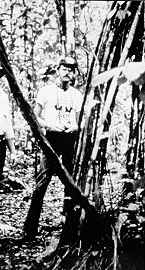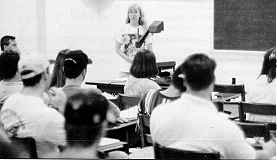Requirements for a Career in Botany
Four years of college and a Bachelor's degree are the minimum requirements for most careers in botany. With these, positions are available as laboratory technicians or technical assistants in education, industry, government, museums, parks and botanical gardens. As in other fields, a wider range of positions is available with more education and experience. Many positions require a Master's or Doctor's degree. A Ph.D. is required for most teaching and research positions in colleges and universities.
High School Preparation1. Course work 2. Extracurricular activities 3. Become informed College Program of StudyThe courses you select will vary depending on the curriculum of the college you attend and your own interests. To be best prepared for the job market, you should get a broad general education in language, arts, humanities and the social sciences in addition to specializing in plant biology. Most curricula require math, through calculus, and/or statistics as well as chemistry and physics. You should know how to use a computer. Some schools recommend, or require, a foreign language. This is especially important if you hope to work in the tropics. Many colleges and universities require a core program in biology before you may enroll in specialized botany courses. At other institutions you can take botany courses right away. A faculty advisor will help you decide what courses to take. Whether your advisor is a botanist or not, visit with other botany professors in the department and ask for their suggestions. If possible, you should arrange to do an undergraduate research project under one of your professors. The project might include helping the professor with his/her research or pursuing your own independent interests. This experience will help you decide which area or areas of botany you like best. It will also give you valuable insight into how science works. Research experience will also be very helpful should you decide to pursue graduate work. Summer jobs or internships can provide important additional experience. These positions occur in government agencies, college and university research laboratories, agricultural experiment stations, freshwater and marine biological stations, and private companies. Start investigating summer opportunities early - the previous fall or winter. The best positions are usually filled by late spring. The best piece of advice, regardless of your interests or which school you attend, is get to know the faculty. If you have questions about a course, ask your teacher after class or during office hours. If you are interested in laboratory or field work, let the faculty know and offer your services. Faculty are "turned on" to students who show interest - and you will be "turned on" to Botany! Side-bar: On Teaching BotanyI became a botanist without knowing it! A shift of interest evolved gradually during my development as a biology teacher. After earning B.S. and M.A. degrees in zoology, I began teaching general biology at a community college in Southern California. My undergraduate background included courses in general botany and plant physiology, but my teaching assignment motivated me to learn much more about plants. I apprenticed with botanical colleagues studying the local flora so I could do a better job of leading my students on field trips to the nearby mountains and deserts. I also designed new lab exercises that used plants as experimental systems to engage students in the process of science without having to "sacrifice" animals.
In one of those labs, my students and I used the sensitive plant (Mimosa) to study the universal biological property of "excitability," the capacity of organisms to sense environmental changes and respond to those stimuli. I never imagined that I would return, several years later, to the rapid leaf movements of the sensitive plant as an experimental model in my own research. When I decided to resume graduate work to earn a Ph.D. degree, I chose the University of California at Riverside only because it was close enough for me to keep my teaching job. I studied the structure and function of salt glands that enable certain desert plants to thrive in salty soil. After publishing several papers, I accepted a faculty position at Cornell University, where my research focused on the cellular mechanism of leaf movements. It was not until I was a member of Comell's Section of Plant Biology that I realized I had become a botanist. My lab and field experiences with general biology students continue to shape my work. For the past several years, I have been writing biology textbooks back in California. It is an activity that keeps me in touch with undergraduates and secures a starring role for plants in my books. Neil A. Campbell, Univ. of California, Riverside. |






